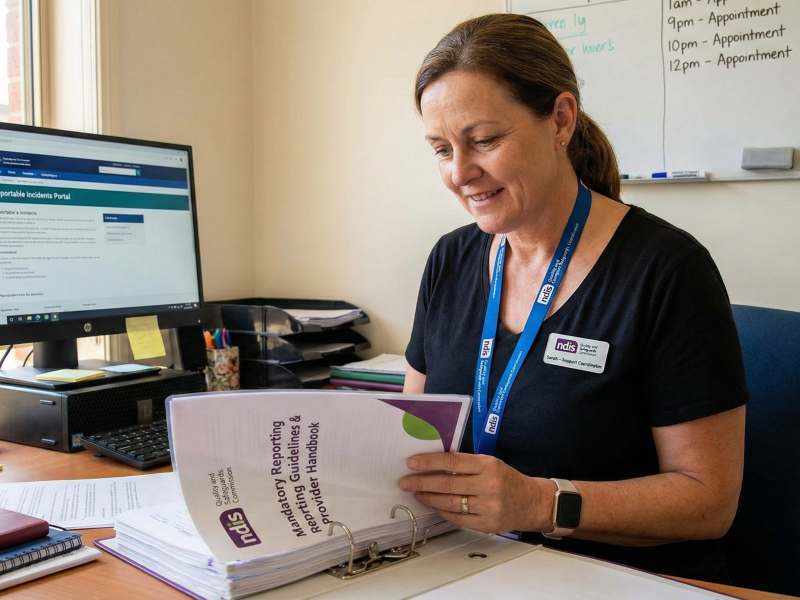The National Disability Insurance Scheme (NDIS) offers NDIS Participants the flexibility to choose between Registered and Unregistered NDIS Providers when accessing approved supports and services. NDIS providers are a crucial part of the NDIS; without them, the scheme would not exist.
Many consider obtaining Registration the best option for NDIS Providers, but that may not always be the case. Registration can be a costly and time-consuming process, and is not required for all NDIS services. Let’s take a closer look at what it means to be an Unregistered NDIS Provider!
What is an Unregistered NDIS Provider?
An Unregistered NDIS Provider delivers supports and services to NDIS Participants. However, only self-managed or plan-managed NDIS Participants can choose to receive supports and services from Unregistered NDIS Providers.
The NDIS Quality and Safeguards Commission (NDIS Commission) is responsible for overseeing the quality and safety of NDIS supports and services delivered to NDIS Participants. Unregistered NDIS Providers are not registered as Providers with the NDIS Commission and have not completed the NDIS Registration process, including external Auditing.
Being unregistered means you can deliver many services to NDIS Participants, but restrictions apply. From 1 July 2025, Unregistered NDIS Providers:
- Cannot provide support and services to National Disability Insurance Agency (NDIA)-managed NDIS Participants.
- Cannot provide Specialist Disability Accommodation (SDA) supports to any NDIS Participants.
- Cannot provide Supported Independent Living (SIL) services to any NDIS Participants.
- Cannot provide Behaviour Support services to any NDIS Participants.
- Cannot implement any Regulated Restricted Practices with any NDIS Participants.
- Cannot provide Support Coordination services to any NDIS Participants.
- Cannot provide Plan Management Services to any NDIS Participants.
- Those who provide Residential Aged Care cannot provide supports and services to any NDIS Participants.
NDIS Code of Conduct and Unregistered Providers
The NDIS Code of Conduct ensures the delivery of safe, quality supports and services to NDIS Participants. The NDIS Code of Conduct applies to all Providers of NDIS supports and services, including Unregistered NDIS Providers.
The NDIS Code of Conduct requires Providers and their Workers to:
- Act with respect for individual rights to freedom of expression, self-determination, and decision-making by relevant laws and conventions
- Respect the privacy of people with disability
- Provide support and services safely and competently with care and skill
- Act with integrity, honesty, and transparency
- promptly take steps to raise and act on concerns about matters that might have an impact on the quality and safety of supports provided to people with disability
- Take all reasonable steps to prevent and respond to all forms of violence, exploitation, neglect, and abuse of people with disability
- Take all reasonable steps to prevent and respond to sexual misconduct
- not charge or represent higher prices for the supply of goods for NDIS Participants without a reasonable justification.
Becoming an Unregistered NDIS Provider
Becoming an Unregistered NDIS Provider involves the following steps:
- Create your Business: Determine your entity structure and register your business on the Australian Business Register. Procure essential insurances to protect your business.
- Understand the Services You Can Provide: Determine the support services your business intends to offer, and verify your organisation collectively holds relevant qualifications or experience.
- Understand Compliance Needs: Though you do not have to register with the NDIS, you must comply with the NDIS Code of Conduct and associated state laws for service delivery. You will also need to ensure the supports and services you intend to provide are funded by the NDIS.
- Market Your Services: Engage with potential customers using social media, networking, or NDIS plan managers to create a client base.
- Provide Quality Services: be professional, prioritise participant safety, and offer high-quality support to develop a good reputation in the industry.
Should You Become An Unregistered NDIS Provider?
Choosing to operate as an Unregistered NDIS Provider offers potential advantages, including:
- Less Administrative Burden: Unregistered Providers avoid the initial Registration Application and ongoing auditing processes required for Registered Providers.
- More Flexibility: Unregistered Providers can set their own prices and timeframes for services. Registered Providers must bill according to the latest NDIS Pricing Arrangements and Price Limits set by the NDIS.
- Opportunity to Enter the Industry: Becoming an Unregistered Provider allows sole traders and small businesses to enter the NDIS sector without the additional regulatory burdens associated with applying for Provider Registration.
- Direct Client Relationships: The ability to provide lower-risk supports and services to self & Plan-Managed NDIS Participants, without needing to engage the NDIA.
Services Offered by Unregistered NDIS Providers
Unregistered NDIS providers can offer a variety of lower-risk NDIS supports and services, including:
- Personal Supports: Assistance with personal care and everyday activities such as bathing, dressing and administering medication.
- Support Work: Support with domestic chores, transport, and community participation.
- Therapeutic Services: Therapeutic supports such as speech therapy, occupational therapy, and physiotherapy (where professionally competent).
- Social Support and Companionship: Skill development and companionship during social activities.
- Assistive Technology and Equipment Supply: Supply mobility aids and other disability-related equipment.
Things to Know Before Becoming an Unregistered NDIS Provider
Before you become an Unregistered NDIS provider, keep the following in mind:
- Restricted Client Access: You can only serve self-managed and plan-managed participants.
- Restricted Support Offering: You are restricted from providing crucial NDIS services such as Behaviour Supports, SIL, Support Coordination, Plan Management and SDA.
- No Official Listing: You will not be included in the official NDIS provider list without registration. This can significantly impact your ability to find clients.
- Legal Requirements: Ensure you have the required insurances and understand how the NDIS Code of Conduct and applicable laws apply to your service delivery. Remember, additional rules apply when servicing NDIS Participants.
- Reputation Counts: Establishing trust and credibility through quality service delivery is essential to gaining clients.
Things to Consider When Considering an Unregistered NDIS Provider
If you are an NDIS Participant potentially looking to engage an Unregistered Provider, you should consider the following factors:
- Service Delivery: Ensure the services you need can be delivered by an Unregistered Provider. Many crucial NDIS supports and services are reserved for Registered Providers, such as SIL and behaviour supports.
- Qualifications and Experience: Check if the Provider has the appropriate qualifications, skills and experience for the supports and services you need.
- Adherence to NDIS Code of Conduct: Find out how they adhere to ethical practices and safety measures for NDIS Participants, including how they implement the Provider responsibilities set in the NDIS Code of Conduct.
- Client Reviews and Recommendations: Check testimonials and request referrals to determine their credibility and ensure they have the capability to provide the support you need.
- Insurance Coverage: Ensure the Provider is covered by public liability and professional indemnity insurance.
- Clear Communication: Establish expectations, price, and service agreement before commencing services. Ensure you have details in writing, as Unregistered Providers do not have to charge according to the NDIS Pricing Arrangements and Price Limits.
Key Responsibilities of an Unregistered NDIS Provider
Unregistered NDIS providers have some key responsibilities they must maintain, including:
- Providing High-Quality Support: Ensuring the safe and effective provision of services to all NDIS Participants.
- Conforming to Ethical Expectations: Staying compliant with the NDIS Code of Conduct and respecting the individual rights and values of NDIS Participants.
- Preserving Proper Records: Having transparent records of services and supports provided to NDIS Participants.
- Guaranteeing Participant Safety: Providing safeguards to prevent participants from getting hurt or being neglected. Providers should have policies and procedures dedicated to such safeguards.
Pros & Cons Of Becoming an Unregistered NDIS Provider
Pros:
- Quick entry into the industry with minimal bureaucracy.
- More control over pricing.
- Ability to work independently without NDIS audits.
Cons:
- Limited client base (only self-managed and plan-managed participants).
- Limited support offerings (eg no SIL, SDA, behaviour supports)
- No access to NDIA-managed funds.
- Lack of official recognition from NDIS can lead to difficulty finding self-managed clients.
- Responsibility for ongoing compliance and business management falls entirely on the Provider, without guidance from Auditors or Registration Consultants.
However, to overcome the cons of being an unregistered provider, you can choose to register, and the process can be less complex with Avaana.
Conclusion
To become an NDIS Provider is a commercial dream for many Australians. Although being an unregistered NDIS provider is technically possible, especially for small enterprises delivering limited services, the growing regulation in the disability space means this is less of a plausible option in the long term. Unregistered providers are limited in service provision, accessing funding, and gaining participant trust. That’s why registering as an NDIS provider is the smarter and more sustainable option to help you reach your NDIS-related objectives. With Avaana’s professional expertise and end-to-end assistance, going through the registration process is easier, quicker, and more efficient, enabling you to do what you do best: providing quality care.
FAQs
How do you become an Unregistered NDIS Provider?
To become an Unregistered NDIS Provider, you need to set up a business, ensure compliance with the NDIS Code of Conduct, obtain insurance, and market your services to self-managed and plan-managed participants. However, being a registered NDIS provider is a more recommended option for long-term growth.
What are the cons of being an unregistered NDIS provider?
Some drawbacks include limited visibility to NDIS Participants, limited support offerings, no official recognition from NDIS, no access to NDIA-managed funds, and full responsibility for compliance and business operations.
How do unregistered NDIS providers get clients?
Though the bandwidth of unregistered providers is not as much as registered providers, they find clients mainly through word-of-mouth referrals, networking with NDIS plan managers and using social media marketing.
Can an unregistered NDIS provider provide SIL?
No, Unregistered Providers cannot offer many services to NDIS Participants, including Supported Independent Living (SIL) and Specialist Disability Accommodation (SDA). Many supports are reserved for Registered Providers to ensure the ongoing safety of NDIS Participants and high standards of service delivery.
How long does it take to become a Registered NDIS provider?
NDIS Provider Registration can range from several weeks to several months, depending on the complexity of the services and the audit process. Avaana – the NDIS Provider Registration experts- can help you through every step of the Registration process to make it easier!


